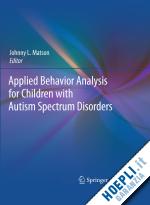
Questo prodotto usufruisce delle SPEDIZIONI GRATIS
selezionando l'opzione Corriere Veloce in fase di ordine.
Pagabile anche con Carta della cultura giovani e del merito, 18App Bonus Cultura e Carta del Docente
Autism was once thought of as a rare condition, until the Centers for Disease Control and Prevention’s Autism and Developmental Disabilities Monitoring Network released the statistic that about 1 in every 150 eight-year-old children in various areas across the United States is afflicted by an autism spectrum disorder, or ASD. This news led to a dramatic expansion of research into autism spectrum disorders and to the emergence of applied behavior analysis (ABA) as the preferred method of treatment, even among prescribing practitioners.
Applied Behavioral Analysis for Children with Autism Spectrum Disorders ably synthesizes research data and trends with best-practice interventions into a comprehensive, state-of-the-art resource. Within its chapters, leading experts review current ABA literature in depth; identify interventions most relevant to children across the autism spectrum; and discuss potential developments in these core areas:
This volume is a vital resource for researchers, graduate students, and professionals in clinical child and school psychology as well as the related fields of education and mental health.
Johnny L. Matson, Ph.D., is a Distinguished Research Master and Director of the Ph.D. program in clinical psychology in the Department of Psychology at Louisiana State University in Baton Rouge, LA. He is the author of more than 450 publications, including 34 books. In addition, he is the editor-in-chief of two research journals, Research in Developmental Disabilities and Research in Autism Spectrum Disorders. He has served as an expert for the United States Department of Justice, Civil Right Division, and is past president of the Mental Retardation and Developmental Disabilities Division of the American Psychological Association. His research and clinical interests are in autism spectrum disorders and intellectual disabilities.











Il sito utilizza cookie ed altri strumenti di tracciamento che raccolgono informazioni dal dispositivo dell’utente. Oltre ai cookie tecnici ed analitici aggregati, strettamente necessari per il funzionamento di questo sito web, previo consenso dell’utente possono essere installati cookie di profilazione e marketing e cookie dei social media. Cliccando su “Accetto tutti i cookie” saranno attivate tutte le categorie di cookie. Per accettare solo deterninate categorie di cookie, cliccare invece su “Impostazioni cookie”. Chiudendo il banner o continuando a navigare saranno installati solo cookie tecnici. Per maggiori dettagli, consultare la Cookie Policy.